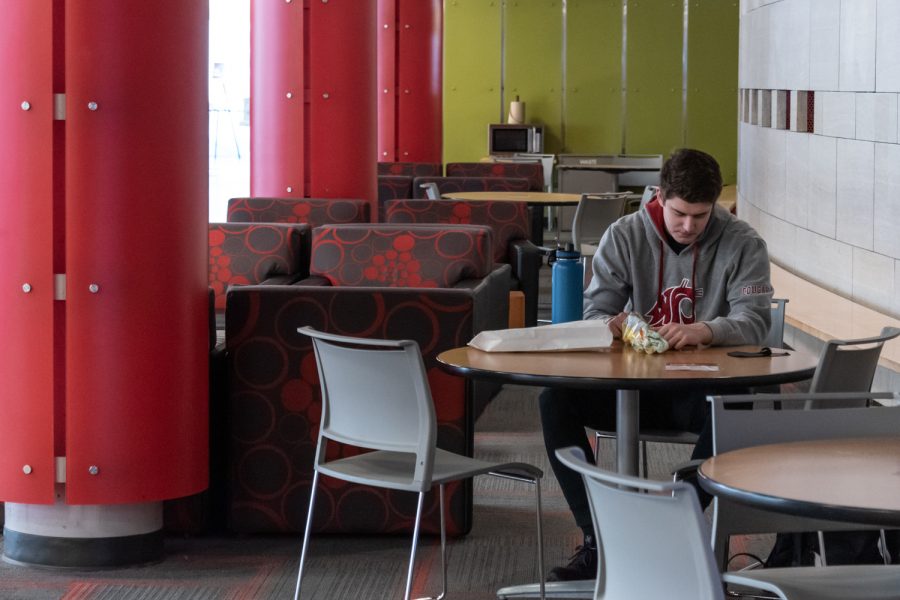Eating alone should be fulfilling
No one is alone in dining alone
MADELINE NEIGEL | DAILY EVERGREEN FILE
WSU student eating and doing school work at the Compton Union Building.
November 11, 2021
I walked into one of my favorite local restaurants a few weeks back. Whenever I go out to eat, I always beg my roommate or a friend to come along. But that night, no one was available to accompany me.
Never had I felt so alienated as I walked through the doors and saw that everyone was sitting at a table with friends or family. I was the only solo diner in the establishment.
The waitress, who knows me well by now, asked me how many people were in my party. I reluctantly told her it was just me, and I could not shake the embarrassment that followed afterward.
The food still tasted amazing, but the atmosphere felt different. I kept peering at the different tables, noting that all of them had at least two people. I began worrying that everyone was looking at me, judging my solitude.
Later the waitress asked me where my friends were because she knew I never ate alone at the restaurant. Once again, embarrassment flooded my veins as I explained no one was able to come.
This experience inspired me to explore the question: Why is eating alone in public deemed a social transgression?
A few studies argue that eating alone poses negative consequences to our mental health, but I am going to take that out of the question. Why has society established this rule that eating alone is taboo?
I have heard from many people that eating at a restaurant alone is embarrassing and shameful. You are almost better off getting your food to-go and sparing yourself the judging eyes.
I am all for human interaction and encouraging social activity. We are a social species and we should never be deprived of an opportunity to be with one of our own.
But perhaps the stigmatization against solo diners is a little unnecessary. We are not always aware of someone’s circumstances and why they are dining alone. Food might have been how we bonded as a species back in the stone age, but that does not mean it is a crime for us to have a meal at a restaurant by ourselves.
Duncan Hintz, freshman computer science major, usually eats alone and does not often care what people think about it. But he said he misses the company when he has not had many other social interactions for the day.
“I think that accepting people dining alone is a very good thing that should be normalized, but I also think that dining with other people is a valuable social experience that can help build friendships,” Hintz said. “I think that people shouldn’t have to feel bad for either option.”
He said he recognizes that eating alone is the least socially acceptable option, so he leans toward normalizing that option first.
Everett Crockett, freshman microbiology major, said he cannot think of a time where he has eaten at a restaurant by himself.
“I feel like most of the time you go out to eat by yourself, it’s either because you really love the food and are passionate about it or it’s out of necessity of some sort,” he said. “You’re so hungry, you really couldn’t care less how it looks.”
Crockett said he would feel sympathetic towards someone who was eating by themselves. He said he sees food as an experience and believes experiences are better shared with people you are close to.
“I believe we should still encourage people to dine together because food is meant to be shared,” Crockett said. “Every time you have a good meal or a bad meal or anything in between, it’s better to have someone experiencing it with you.”
He said he does not believe eating alone is exclusively bad, but solo diners are too small of a minority to be considered in the argument.
One reason why I think we need to remove the stigmatization of solo diners is because it would encourage more dining in. By feeling the pressure to have someone with me at a restaurant, I feel less motivated to dine in at an establishment and more motivated to get my food to-go or delivered.
This, in turn, would make me more isolated than if I sat in a restaurant by myself. At least then I would be surrounded by people even if I am not interacting with them.
Even if the minority of solo diners is small, I still think we should lessen the stigma against them so they do not feel coerced into hiding away.
However, I do agree with the view that we should encourage people dining together. I love being able to spend time with people, and it makes me sad when the opportunity to eat with someone is not there.
Unfortunately, the solution for that is harder to implement. At some point in the future, maybe society can create programs to connect people so that they can eat together. This is technically the case with “mukbangs,” where South Koreans feel less lonely eating food by themselves when watching someone else eat.
I could not find too many things for Americans. The closest thing I could find was Princeton University’s dining clubs, where members get together to share meals and cooking responsibilities.
One day, this could maybe be implemented in communities as a resource. Helping to connect people in this aspect is certainly something that society should focus on in the coming years.
But in the meantime, I wish for people to be able to eat at a restaurant by themselves without the embarrassment of not having somebody accompany them.










